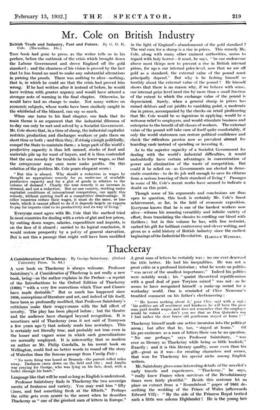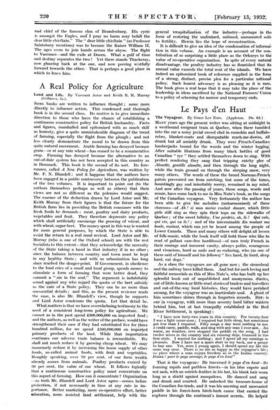Thac keray
A Conaideration-of Thackeray. By George Saintsbury. (Oxford University Press. 7s. 6d.) - A NEW book on Thackcray is always welcome. Professor Saintsbury's A. Consideration of Thackeray is not really a new book, being -as the author explains in the Preface—a reprint of the Introductions to the Oxford Edition of Thackeray (1908) " with a very few corrections which Time and Chance have made desirable." But so much has happened since 1908, conceptions of literature and art, and indeed of life itself, have been so profoundly modified, that Professor Saintsbury's criticism's make their reaprearanee with the full effect of novelty. The play has been, played before ; but the theatre and the audience have changed beyond recognition. It. is sometimes said of Thackeray (was it not said of Tennyson a few years ago ?) that nobody reads him nowadays. This is certainly not literally true, and probably not true even in the looser and vaguer sense in which such generalizations are normally employed. It is noteworthy. that so modern an author as Mr. Philip Guedalla, in his recent book on Wellington, could find no better words to round off the story of Waterloo than the famous passage from Vanity Fair : " No more firing was heard at Brussels—the pm-suit rolled miles away. Darkness came down on the field and city ; and Amelia was praying for George, who was lying on his face, dead, with a bullet through his heart."
Language like that will be read so long as English is understood.
Professor Saintsbury finds in Thaekeray the two sovereign merits of freshness and variety. You may -read him " fifty Clines, and find something fresh at the fiftieth." Perhaps the critic gets even nearer to the secret when he describes Thackeray as " one of the gieriteSt rnen of letters in Europe." A great man of letters he certainly was : no one ever deserved the title better. He had his inequalities. He was not a great critic or a profound historian ; what he wrote on polities " was never of the smallest importance." Indeed his politics were notably weak ; his ," quaint theoretical republicanism with a good deal of pure Toryism mixed " was not—as he seems to have recognized himself—a:make-up meant for is workaday world. One is reminded of Clive Newcomes troubled comment on his father's electioneering : " He knows nothing about it,' poor Clive said with a sigh ; ` his politics are all sentiment and kindness, he aill have the poor Man paid double wages, and does not remember that the employer would. be ruined . . . don't you see that as Don Quixote tr son I had rather the dear brave old gentleman stayed at home 7'" " Thackeray himself made one active incursion into the political arena ; but after that he, too, " stayed at home." Of his pre-eminence as a man of letters there can be no question. " No one perhaps," says Professor Saintsbury, " was ever so literary as Thaekeray while being so little bookish." Exactly ; and it is this literary quality, more even than his gift—great as it was—for creating characters and scenes, that won for Thaekeray his special niche among English writers. - Mr. Saintsbury gives some interesting details of the novelist's early travels and experiences. " Thackeray," lie says, " really knew France when survivors of the Revolutionary times were fairly plentiful." Reside this sentence let us place an extract from a " Roundabout " paper of 1883 de. scribing the wedding of the Prince of Wales (afterwards Edward VII) "By the side of the Princess Royal trotted such a little wee solemn Highlandei I He is the youritt -heir and chief of the famous clan of Brandenburg. His eyrie is amongst the Eagles, and I pray no harm may befall the dear little chieftain." The " dear little chieftain " (as Professor Saintsbury mentions) 'Was to' beconie the Kaiser William II. The ages seem to join hands across the abyss. The flight to Varennes—and the exile at Doorn. What a gulf of time and destiny separates the two ! Yet there stands Thackeray, now glancing back at the one, and now peering wistfully forward towards the other:. That is perhaps a good place in which to leave him.







































 Previous page
Previous page